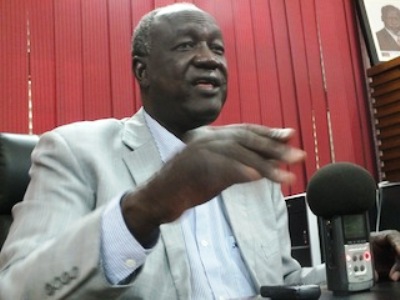S. Sudan rivals trade accusations over control of fighters
May 13, 2014 (JUBA) – South Sudan’s warring parties have accused each other of failing to exert full control of their respective armies, hardly a week after they signed a cessation of hostilities agreement to end the country’s five-month old conflict.

“I know that there would be a challenge on the side of the rebels to implement the cessation of hostilities agreement which was signed in Addis Ababa, Ethiopia. Our forces took the orders the same hour and complied. But the rebels attacked them after it was signed,” Juuk exclusively told Sudan Tribune on Tuesday.
“That was why there were reports of clashes in Unity and Upper Nile states, because Riek Machar does not have control of these forces because I don’t believe they are not really loyal to him,” added the minister.
He said the rebels were “not organised” forces who “do not have a central command”.
“They do not have central command. So they do not know about the cessation of hostilities agreement that was signed”, observed minister Juuk.
South Sudan’s information minister, Michael Makuei Lueth, however, said government would only negotiate with the opposition led by Machar and other stakeholder on condition it was satisfied with the implementation of last week’s ceasefire agreement.
“The priority now is to ensure that the cessation of hostilities agreement is implemented so that it creates conducive environment for other issues to be discussed. As the government we have already started implementing the agreement”, Lueth told reporters in Juba on Tuesday.
“Our forces have already been given orders to stop any movement and other military activities towards the forces of Riek Machar. We also hope the rebel show commitment and seriousness to implementing the agreement”, he stressed.
Minister Lueth reiterated recent calls by president Salva Kiir for pro-government army to halt attacks on rebels positions in compliance with the cessation of hostilities deal.
“President Salva Kiir has given out clear [instructions] to the army to stop launching attacks on to the positions or areas under the rebel forces in some parts of the country, where the latter is presently active against the government forces,” he said.
On Sunday, the South Sudanese leader said he ordered the army not lift a foot from areas under their current deployment towards those controlled by the rebel groups.
“Our army since the night I signed this agreement, I said, you, army, if there is any place that you want to go to where you haven’t been yet, stop from that now,” Kiir said.
“Nobody should go his own way again in order to attack Riek Machar’s forces”.
Machar’s military spokesperson, Brig.General Lul Koang Ruai, however, accused government troops of allegedly attacking and taking control of Unity state’s capital, Bentiu on Monday; a claim South Sudan army spokesperson, Col. Philip Aguer, dismissed.
MIXED REACTIONS
Analysts and observers have said that both sides would face challenges in implementing the deal, with some questioning whether the Uganda troops, currently fighting alongside president Kiir’s forces would adhere to the ceasefire agreement.
“This is a challenging agreement and so the level of influence will now be the determining factor. You have Uganda troops fighting alongside the government but who take orders from Kampala instead of Juba because they are under different command”, said Samuel Lotipe, a native of South Sudan Eastern Equatoria state.
“You can see they are even having their own commander appointed by the president of Uganda [so] telling this forces [Ugandan troops] to stop fighting will have to be approved from the source of the central command”, he added.
Lotipe argued that while the command structure under president Kiir may appear weak to assert full control, the rebel comprise of army defectors and ethnic fighters.
“The military defectors may have control over them because they are the majority and can turn against them if they appear opposed to the objective of the ethnic fighters. So it is difficult to control this group,” he said.
“The only way out is to find someone who would convince them and finding someone they respect and listen to what he says is not an easy thing”, Lotipe stressed.
(ST)
